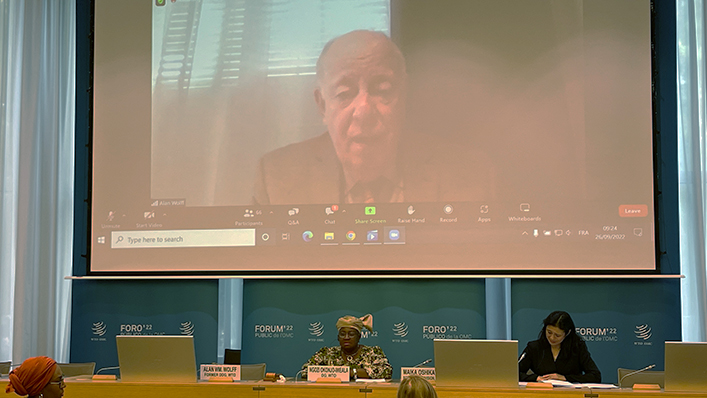
In opening remarks, WTO Director-General Ngozi Okonjo-Iweala said the lecture came “at an opportune time, as members start reform discussions in earnest following the mandate from WTO’s 12th Ministerial Conference” in June this year. “Alan (Wolff) shares Chiedu’s preoccupation with the health of the multilateral trading system, especially the need for the system to evolve and update its rules to better reflect the realities of the 21st century global economy,” she added.
Reflecting on some of Chiedu Osakwe’s ideas on WTO reform, Ambassador Wolff said that “the WTO will be imbalanced, with rights and obligations far from what they should be, unless there is a continuous process of truing up to a higher standard of trade rules applicable to all, consistent with their capabilities.” He added: “WTO reform is more than addressing new and existing issues to be dealt with in substantive rulemaking, it is also making sure that the machinery of governance works.”
Ambassador Wolff stressed that the WTO of the future must be a venue in which members can continue to conclude important negotiations, including the restoration of a binding dispute settlement mechanism acceptable to all.
In his view, that vision must also include a stronger executive function, with a Director-General supported by an empowered Secretariat, which “would help plot the course for the future,” engaging in policy planning and strategic foresight, as well as assuring transparency through intelligence gathering.
On the subject of WTO reform through accession, Ambassador Wolff noted that accession is a key area in which the trading system has made continuous progress since the WTO was established in 1995.
“It has been a mainspring of WTO reform, never dramatic, rarely noted in the headlines, but an important agent of change,” he said. “From the acceding country’s point of view, the most palpable aspect consists of the requirements insisted upon for its domestic reforms. For the WTO as an institution, what is even more important are the reforms that each accession points to as an updated standard for international conduct, nothing short of a levelling up of the system.”
His full remarks are available here.
A recording of the lecture is available here.
The first lecture of this series dedicated to the memory of Ambassador Chiedu Osakwe was delivered on 22 September 2021 by the head of the African Continental Free Trade Area (AfCFTA) Secretariat, Wamkele Mene, who shared his perspectives on “AfCFTA and the WTO: Shaping the future of the multilateral trading system”. A video recording of the session can be found here.
Share
Reach us to explore global export and import deals